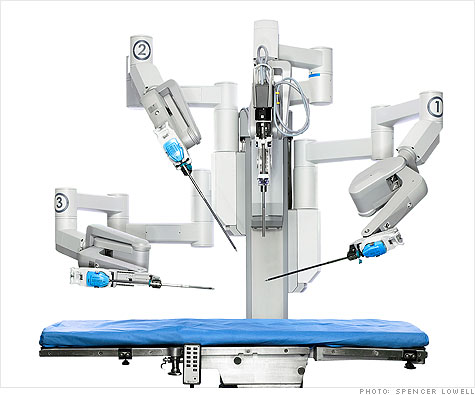 "We're not in this for the showmanship," says one doctor who uses Intuitive Surgical's robotic systems, like this one.
"We're not in this for the showmanship," says one doctor who uses Intuitive Surgical's robotic systems, like this one.
FORTUNE -- Robotic surgery is one of the hottest sectors in the global health care industry right now, and Intuitive Surgical (No. 21) has a corner on it. Intuitive sells million-dollar robotic systems that allow surgeons to remove tumors and suture skin by watching a high-definition video feed from a camera inside the patient while using a joystick and pedals to guide tiny scalpels and needles attached to flexible robotic arms.
At first glance that might seem like the perfect metaphor for the U.S. health care industry, with its high technology driving runaway costs. But what if the opposite were true? Gary Guthart, CEO of the company, based in Sunnyvale, Calif., argues that his technology saves everybody money in the long run. The surgeries are less invasive, so patients go home and return to work earlier. There are fewer complications, which reduces cost overruns for hospitals, private insurers, and the government. "The economics of computing the implications are pretty complex, but we think it benefits society," says Guthart, 44, a robotics expert who helped develop the basic technology for computer-assisted surgery as a researcher at SRI International in the early 1990s.
It has certainly benefited Intuitive, which earned $290 million on sales of $1.2 billion last year and increased revenue by an average of nearly 41% a year from 2007 to 2009. Intuitive (ISRG) has no significant competition as a provider of computer-assisted surgical technology, which is widely used today for minimally invasive cardiac and urological procedures and could potentially transform most forms of surgery. "In our view they've got a decade's worth of technological lead," says Les Funtlayder, a health care strategist at investment firm Miller Tabak, based in the New York City. "We don't see too many gating factors to continued growth, other than the initial cost of the machines."
A growing body of clinical evidence supports Guthart's economic argument. Dr. Rakesh Suri is a cardiovascular surgeon at the Mayo Clinic in Rochester, Minn. He and his partner, Dr. Harold Burkhart, have performed more than 200 mitral valve repair procedures using Intuitive's da Vinci surgical system. Suri's patients leave the hospital after three days on average, vs. five to seven days for open-chest patients. Most robot-assisted surgery patients are back at work after two to four weeks, compared with six to eight weeks for open-chest patients. Over the first 100 surgeries, average cost declined by 5% to 10% compared with conventional open-chest surgery. Suri cautions, however, that robotic surgery is not currently appropriate for "redo" procedures and certain clinical conditions. "We're not in this for showmanship," he says.
One downside risk for Intuitive is that surgeons who aren't thoroughly trained on the system can hurt patients. At Mayo and other top hospitals, surgeons train extensively on animals and cadavers before they use the da Vinci system on real patients. But early this year a woman patient sued a New Hampshire hospital and two surgeons who botched her hysterectomy using a da Vinci system. The suit alleges that the surgeons were insufficiently trained on the system. Intuitive was not named in the suit and seems unlikely to face either legal or financial consequences.
So is expensive health care really cheap? While the evidence suggests that the da Vinci system really does lower surgical costs in the longer term, it's less clear that high technology by itself can reduce skyrocketing costs across the U.S. health care system. Worst case for Intuitive and its shareholders: Health care gets more expensive, and the company makes even more money. ![]()






| Company | Price | Change | % Change |
|---|---|---|---|
| Ford Motor Co | 8.29 | 0.05 | 0.61% |
| Advanced Micro Devic... | 54.59 | 0.70 | 1.30% |
| Cisco Systems Inc | 47.49 | -2.44 | -4.89% |
| General Electric Co | 13.00 | -0.16 | -1.22% |
| Kraft Heinz Co | 27.84 | -2.20 | -7.32% |
| Index | Last | Change | % Change |
|---|---|---|---|
| Dow | 32,627.97 | -234.33 | -0.71% |
| Nasdaq | 13,215.24 | 99.07 | 0.76% |
| S&P 500 | 3,913.10 | -2.36 | -0.06% |
| Treasuries | 1.73 | 0.00 | 0.12% |
|
Bankrupt toy retailer tells bankruptcy court it is looking at possibly reviving the Toys 'R' Us and Babies 'R' Us brands. More |
Land O'Lakes CEO Beth Ford charts her career path, from her first job to becoming the first openly gay CEO at a Fortune 500 company in an interview with CNN's Boss Files. More |
Honda and General Motors are creating a new generation of fully autonomous vehicles. More |
In 1998, Ntsiki Biyela won a scholarship to study wine making. Now she's about to launch her own brand. More |
Whether you hedge inflation or look for a return that outpaces inflation, here's how to prepare. More |